Admitted into art & design school? Congratulations!
Here are some tips and tricks on how to make the most out of each and every class throughout your studies.
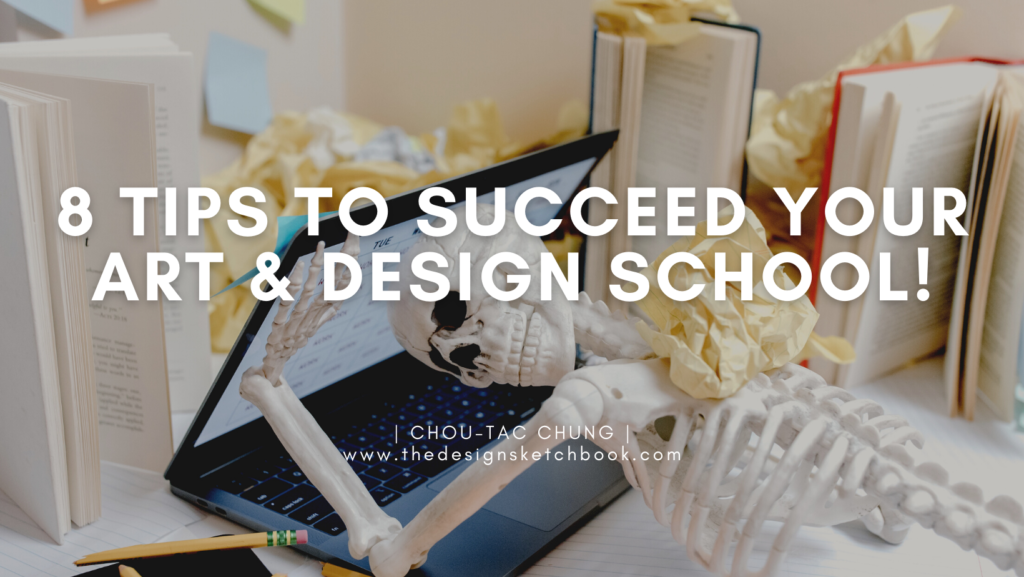
How to Make the Most Out Of Your Art & Design School Studies
The 8 Student attitudes of Achievers (vs Complainers).
- Feel gratitude
- Stop complaining to achieve more
- Starting simple is key.
- Be proud of your school
- Love the design process
- Don’t skip the basics of sketching
- Gamify
- Complainers drown in their Comfort Zone
I’ve just received a happy message from Lola Lalic!
She has been accepted into one of the best Design schools in her country!
And I am glad the Design Sketchbook Tips got helped her to pass her entrance exam.
Do you believe that anyone can learn how to draw?
Well, I can tell you from my own experience, it’s true!
When I started my Design School, I thought everyone would be talented artists already.
This was not the case at all – only about 1% had basic drawing skills.
Despite this, I felt incredibly grateful and excited for the opportunity given to me, because my school firmly held the belief that with hard work and practice, anyone could achieve whatever they wanted in terms of art.
So if you’ve always wanted to learn how to paint or sketch, don’t let anyone tell you it’s impossible – with dedication and effort, you can do it!
And you know what? I felt great about it!
Because the school gave me a chance and believed in me.
My school belief (and still mine too) is: “Anyone can learn how to draw. “

Choose your Art & Design school carefully
From what I saw, “elitist schools*” have a very high standard of selection.
It would have been impossible for me to join there.
However, my design school opens its door to anyone with a creative seed, even beginners in sketching.
A private school welcoming a ton of students with low drawing skills can smell like a scam. So be aware of your school selection. I wrote an article to help you with How to choose your Design school.
I was a beginner, I couldn’t sketch.
But “I had a dream in my pocket”.
TIP to become a great designer: Be user-centered
If you want to enroll in any Design School, you need to show your creative potential from start.
Some applicants may draw an amazing car, but it would be always the same. Interviewers will be more sensitive to the variety of your ideas than a “single sketch performance”.
Show how your ideas can pop into your head like a firework!
If you have any creative task, it is the moment to dare to propose impossible things! What will matter the most is: How your ideas will benefit the users.
If you can have:
Multiple daring ideas + User-centered = Creative Firework!

TIP To become a great designer: Contribute to the world
Some design schools may ask you some questions about art and design culture.
If you lack culture as I did, make sure your motivation is transmitted on these 2 points below.
To me, creativity for a designer is mainly based on:
- your Curiosity
- your desire to Innovate for people
It is as simple as that. Tell your interviewer why you want to become a designer, and what value you may bring to the world.
Do not only talk about what you want to have such as celebrities or money. There is nothing wrong with these goals. But what you want your interviewers to remember is someone who is willing to give his time and mind to help others.
You may be a beginner today, but your potential is huge.
So, Dream Big!
The disillusion
Since my school believed Drawing could be taught to anyone.
I thought they would teach us step-by-step how to draw.
My expectation was so wrong.
The learning journey at school was like a nightmare for all of us.

We had to learn everything from the ground:
- Ergonomy,
- Creativity,
- Mock-up,
- Marketing,
- Portfolio,
- Technology
- … and of course, drawing.
They gave us so many projects to handle.
We were damn overwhelmed…
We had to express visually our projects with drawings.
“But we didn’t know how to draw (yet)!
Many of us lost confidence and some gave up.
The reality showed that our school and so many others are not perfect. From that standpoint, two little voices started to show up among students.
I call them:
- The miniature “You Complainer” who pushes you to give up
- The miniature “You Achiever” who pushes you to keep up
Both are in permanent duality.
You got to choose which voice to follow and let fully express. Soon or later, one will take over and decide your failure or your success.
The term “Complainer” seems a bit judgemental. That is not my intention. I wanna make sure you don’t get into a “falling trap”.
If you define yourself as a Complainer, I wish today to help you to switch to an Achiever.
Let’s see together the 8 attitudes of Complainers versus Achievers.
Attitude 1. Feel gratitude

Complainers take things for granted
The design school was expensive. We could indeed have high expectations.
The reality was:
- Internet connection was missing
- Computers were obsolete
- No library
- There were no digital tablets for everyone
- Software courses were too basic
- We didn’t have money for the Adobe software license
- …
Complainers keep saying: “We should have…” and take these as an excuse to do nothing.
Achievers are grateful
They accept the imperfect reality and embrace their chance of being in the middle of such a creative hub.
They appreciate:
- Our teacher’s expertise (most teachers were professionals in touch with the market)
- The great location of art influence (museums, sculptures, libraries, and huge book shops in Paris)
- The school network
- The invaluable creative teaching focusing on users
- The special weekly course on Portfolio and career
- The open mind class about design and strategy
- …
They get inspired by success stories of students joining amazing companies for internships or careers.
My recommendation:
Focus on work and progress, positive energy will flow. All of sudden, great things will happen to you if you believe. It is not about magic, but science.
Your train your mind like a muscle to spot ideas, alternatives, and opportunities… to become resourceful.
Complainers’ and Achievers’ realities are both true.
Which one do you prefer to follow?
Attitude 2. Complaining = Waste of time

Complainers stagnate forever
- They drag their pain for days, weeks, months, years… The longer they can’t draw, the longer the pain.
- They get more and more frustrated at not being able to explain their ideas visually. They feel “mute”.
- Years pass, and it becomes harder and harder to justify why they still can’t draw.
Achievers start early
- They understand the importance to learn how to draw early.
- They try to put into practice every project that they have learned in drawing class.
- They test, explore, and experiment like a mad scientist in his lab.
It is not easy. But progress and discoveries pop sometimes. They keep motivated.
My recommendation:
- A designer who can’t draw is somehow like a bird without wings. Make them grow as early as possible.
- Think like “Nobody cares about your complaints” as nobody will after school.
- Start growing your wings now as wide and strong as you can. Become independent asap during your studies so you can apply for your dream design companies.
Attitude 3. Starting simple is key.

Complainers focus on sophisticated tools
- My friend told me once: “I will start drawing when I’ll buy a digital tablet. But I don’t know which one to buy. Do you have any recommendations?”
Achievers focus on skills
- They understand that a good tool doesn’t make a good designer. They
- They start simple and now with a simple ballpoint pen or any available at the moment.
My recommendation:
- Invest your time and money in growing your skills. Not wasting time choosing for ages the newest material while you have no skill yet. Without skills, your tablet is just a plastic box.
- Note there is no minimum time to start on digital tools. However, know your priority. Get the first ballpoint pen you find, and draw.
Attitude 4. Be proud of your Art & Design School

Complainers talk badly about their school
- They say plenty of bad things about school, the teachers, the direction… but complainers keep coming every morning in class year after year (with a grumpy face).
Achievers progress
- They focus on work and get exciting results.
- One day soon, the school will be proud of them.
My recommendation:
- Quit school or Stay to do great! Why stay in a school for many years while you feel unhappy?
- If you decide to stay, stop trying to change the school, but change yourself and target the top 10% of students.
- To get there, replace “I can’t” with “What can I do to…”
Attitude 5. Love the design process

Complainers are impatient
- They focus on the result.
- They expect to get amazing sketches, while they skipped the sketching basics.
- They do mistakes and feel discouraged “expecting miracles”.
Achievers build slowly but steady
- They struggle to learn and that’s ok. They do plenty of mistakes along the way but find a way to assemble the bricks.
- They act like detectives. They love spending hours studying new techniques while working on their homework.
My recommendation:
- Enjoy the satisfaction doing progress.
- It may not be good yet, it is better than yesterday.
- Some day soon, what is hard today will become easy. So easy people will think you are born talented.
Attitude 6. Don’t skip the basics of sketching
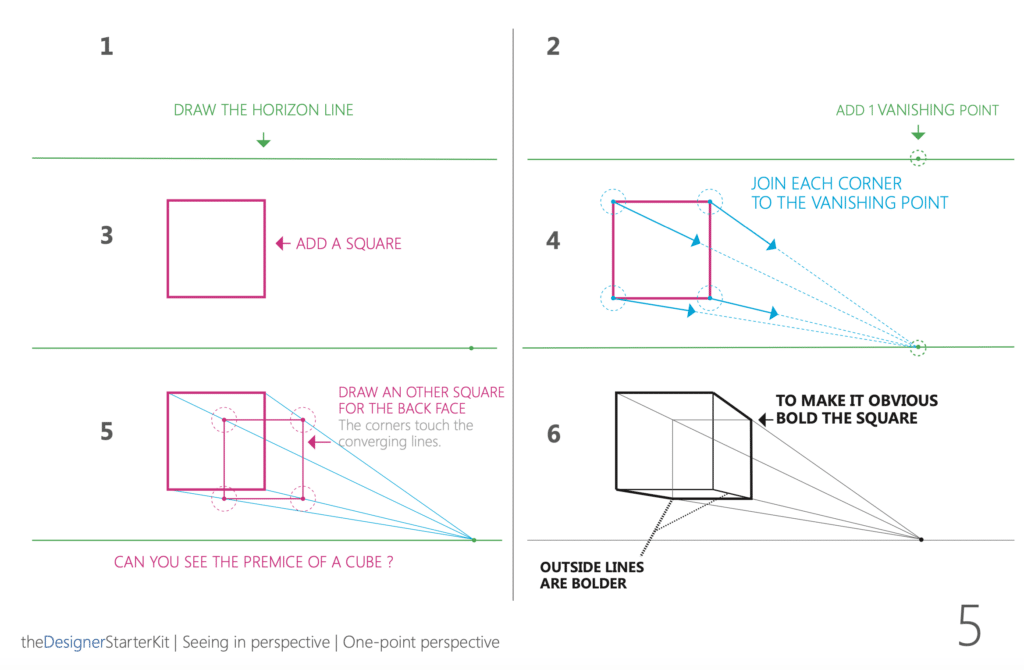
Complainers shortcuts.
- They look for ways to avoid sketching.
- They focus only on 3D software.
Achievers fundamentals.
- They know sketching is their best shortcut for freedom and pure creativity.
- They learn perspective to build up their ideas.
My recommendation:
- 3D software is an amazing asset. However, ask yourself why you originally came to school. To create, or to 3d renderings?
- Sketching is your passport for creative roles. By focusing on 3d software, you may end in a job specializing at modeling other people’s ideas.
- Also, remember that a technical person is replaceable. A creative person is unique and got highly more value.
If creativity is your call, don’t sell your soul to the devil for the sake of having a beautiful portfolio. It may be an empty creative shell.
Note: I have friends who succeed to become great sketchers and 3D modelers.
Attitude 7. Gamify

Complainers are victims
If they fail, it is because of external factors:
- “The school has bad teachers.”
- “Markers are too expensive.”
- “We have no time to complete our projects.”
- “I need to work after school.”
- “I have no space for drawing.”
- …
It’s never their fault.
Achievers play like Super Hero!
- If you fail, it is because you didn’t try enough yet.
- You love challenges like video games.
- You face obstacles and you know they can be beaten.
- You fail many times but you gain experience and strength to keep going until you face the big boss again and again till you kick his butt!
My recommendation:
- If you decide to enroll in the school, no matter how bad it is, it was your choice.
Don’t act like a victim. If you are not happy, do something to get better. - Video games are parametered by their creators to be achievable.
In real life, there are no creators. There is no guarantee of success.
But if you don’t play, you’ll never know! Remember that Life is the best game! - If you lose, learn, stand up, replay, and save the princess!
Note: The good thing is, that there is no creator to decide on how much success you can become. While modern games are betting so much on AI to replicate life, we must remember the most exciting game is our own life.
Attitude 8. Complainers drown in their Comfort Zone
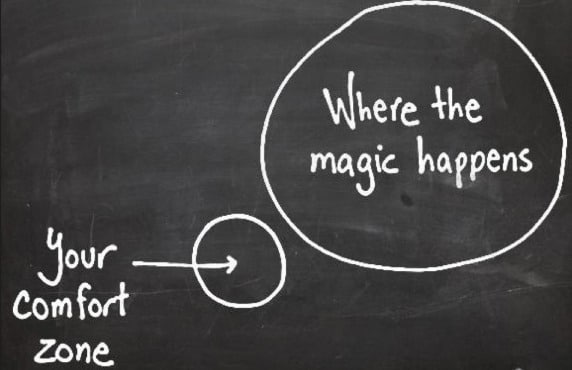
Complainers keep swimming in a tiny lake
- Complainers attract complainers, and they all swim in a tiny lake till it gets too small for everyone.
- Complaining is easy and gives a feeling of security. This is why we don’t wanna go outside swim in the river, torrent, waterfalls… and float on a lake.
Achievers challenge the world!
- You get out of this toxic circle.
- Find a new circle of achievers to help and lift each other.
My recommendation:
- There is no need to try to debate with complainers.
- The best way is to show by example. Focus on your success. You will inspire them and give them a hand when they feel ready.
Conclusion
Art and design schools are unique from each other. They have different philosophies, registration terms, rates of success, alumni success stories…
Some more. There are 3 viewpoints:
- The school pitch and reputation
- Your perception of the school
- The reality
My recommendation is:
- Visit the Design school and do not base fully your choice on their website, brochure, and what people say.
- Don’t let yourself be impressed by the design school’s reputation. Schools like Parsons School of Design, Art Center College of Design, RISD: Rhode Island School of Design are surely impressive. But go and see from your eyes to make your own opinion, and ask questions.
- I had the chance to have David Salow from Art Center College of Design for an interview on the blog. He told us that he invites all students to present their portfolios. As the entry-level is high, he gives individual feedback on how to improve and apply again.
- Meet the teachers, directors, and especially the students. You can meet them at lunchtime or exit time of the school when they hang out in front of the school.
- You can reach Behance, Coroflot, Linkedin to find alumni’s work, and contact them.
- Listen to people’s opinions, but build your own.
- When you got all the cards in hand, and you have chosen your school, stop expecting, and start doing.
- Avoid toxic classmates and put yourself at 150% to be among the top 10% of design students.
In my opinion, not everyone can succeed. But anyone can succeed, no matter your background or actual sketching skill. Your actions will shape your path.
Cheers,
Chou-Tac
*Learn more about the famous Art Center School of Design, in the rare interview with David Salow who shares with us the behind-the-scenes of the tough selection process of the students.
** Learn about the Super Mario Effect with “Tricking Your Brain into Learning More” | Mark Rober
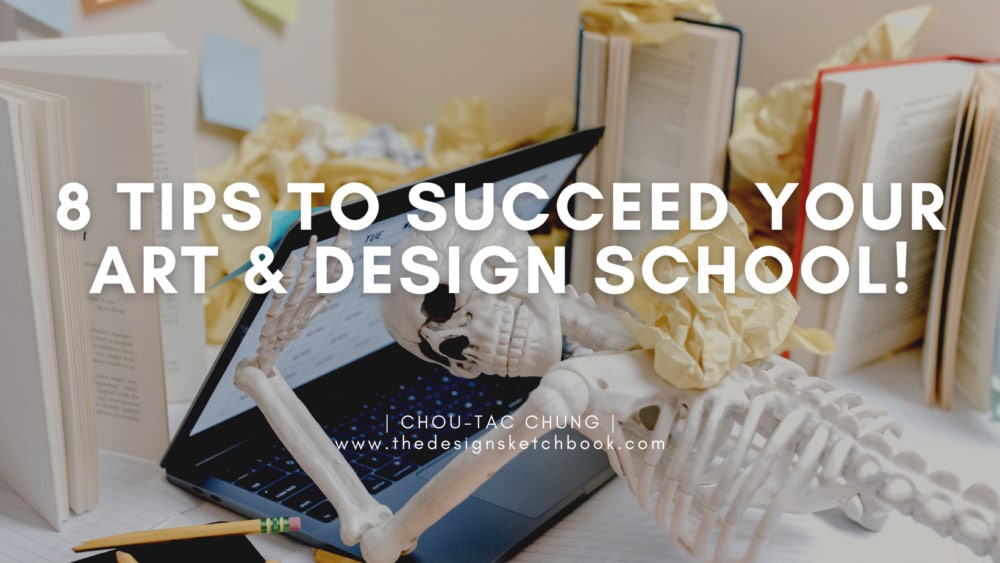

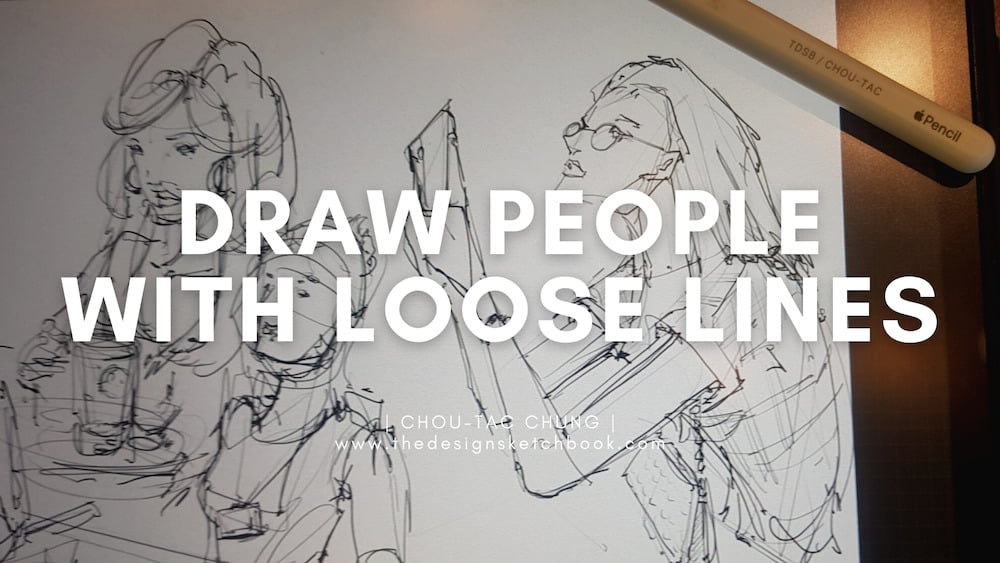








[…] remember those days in design school.We’d spend hours together, sketching, creating, and bouncing ideas off each other. It was […]
Very enlightening article.
Been reading your blog little by little for some time now but i had to comment on this one.
Cheers from the 128, rue de Rivoli, Paris.
Hi Adrian,
Oops, just saw your messages by chance. 🙂
Please say hello to the team Creapole-ESDI!
If you may have any content ideas for the blog, it would be warmly welcome.
Have a great day!
Cheers,
Chou-Tac
Seriously great blog Thank you so much for your valuable insights, the right mindset is the key to success. Am currently reading the book ‘Minset’ by Carol Dweck. A very refreshing blog!
Thanks for sharing Derek!
Carol Dweck has a great definition of the Growth mindset.
“In a growth mindset, people believe that their most basic abilities can be developed through dedication and hard work—brains and talent are just the starting point. ”
I like that 🙂